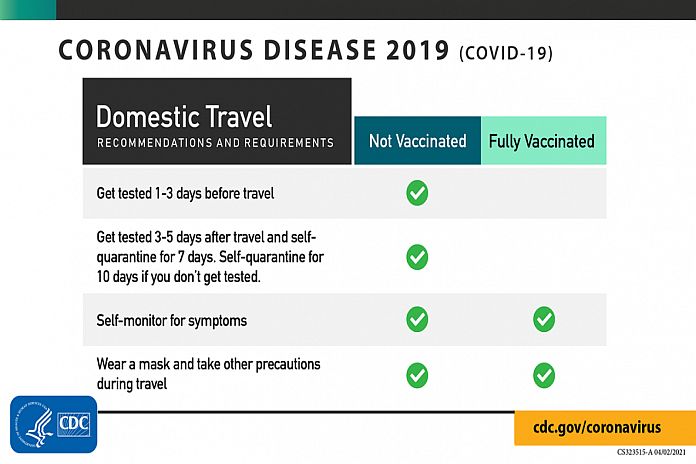ATLANTA, USA, (CDC) – Delay travel until you are fully vaccinated. If you are not fully vaccinated and must travel, follow CDC’s recommendations for unvaccinated people.
People who are fully vaccinated with an FDA-authorized vaccine or a vaccine authorized for emergency use by the World Health Organization can travel safely within the United States.
CDC will update these recommendations as more people are vaccinated, as rates of COVID-19 change, and as additional scientific evidence becomes available. This guidance applies to travel within the United States and US territories.
Domestic travel recommendations for fully vaccinated people
If you are fully vaccinated, take the following steps to protect others when you travel:
- During Travel
- Wearing a mask over your nose and mouth is required on planes, buses, trains, and other forms of public transportation traveling into, within, or out of the United States and in U.S. transportation hubs such as airports and stations.
- Follow all state and local recommendations and requirements, including mask wearing and social distancing.
- After Travel
- Self-monitor for COVID-19 symptoms; isolate and get tested if you develop symptoms.
- Follow all state and local recommendations or requirements.
You do NOT need to get tested or self-quarantine if you are fully vaccinated or have recovered from COVID-19 in the past 3 months. You should still follow all other travel recommendations.
Domestic travel recommendations for unvaccinated people
If you are not fully vaccinated and must travel, take the following steps to protect yourself and others from COVID-19:
- Before you travel:
- Get tested with a viral test 1-3 days before your trip.
- While you are traveling:
- Wear a mask over your nose and mouth. Wearing a mask is required on planes, buses, trains, and other forms of public transportation traveling into, within, or out of the United States and in US transportation hubs such as airports and stations.
- Avoid crowds and stay at least 6 feet/2 meters (about 2 arm lengths) from anyone who is not traveling with you.
- Wash your hands often or use hand sanitizer (with at least 60% alcohol).
- After you travel:
- Get tested with a viral test 3-5 days after travel AND stay home and self-quarantine for a full 7 days after travel.
- Even if you test negative, stay home and self-quarantine for the full 7 days.
- If your test is positive, isolate yourself to protect others from getting infected.
- If you don’t get tested, stay home and self-quarantine for 10 days after travel.
- Avoid being around people who are at increased risk for severe illness for 14 days, whether you get tested or not.
- Self-monitor for COVID-19 symptoms; isolate and get tested if you develop symptoms.
- Follow all state and local recommendations or requirements.
- Get tested with a viral test 3-5 days after travel AND stay home and self-quarantine for a full 7 days after travel.
- Visit your state, territorial, tribal or localexternal icon health department’s website to look for the latest information on where to get tested.
Traveling Internationally?
Check CDC’s COVID-19 Travel Recommendations by Destination before planning your trip.
Source: CDC





